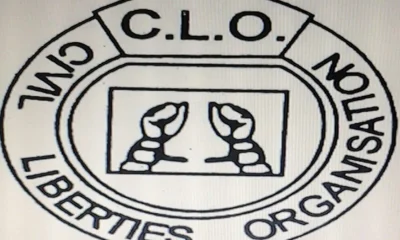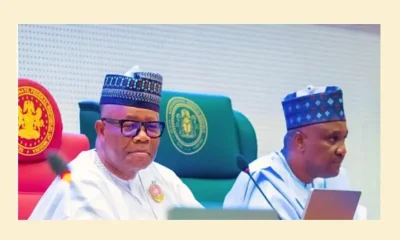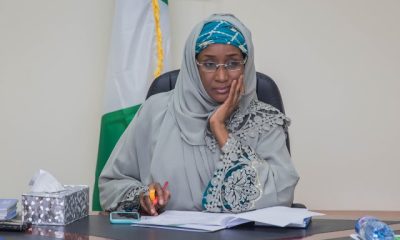NIGERIA NEWS
SERAP Urges Nigerian Government to Drop Charges Against Activists, Journalists, and Rights Defenders

The Socio-Economic Rights and Accountability Project (SERAP) has called on both the Nigerian Federal Government and state governments to drop criminal charges against activists, journalists, rights defenders, and others who are on trial solely for peacefully exercising their human and democratic rights.
SERAP also urged the government to immediately release anyone still being arbitrarily detained for these reasons. These demands were among the recommendations in a report titled “Broken Promises: Systematic Crackdown on Civic Space, Democratic Rights, and Media Freedom in Nigeria,” released by SERAP on July 3, 2024, in Abuja.
The report assessed citizens’ participation in the democratic process and the protection of dissent in Nigeria. Among other recommendations, SERAP demanded an end to the systematic crackdown on civic space, freedom of expression, freedom of peaceful assembly, freedom of association, media freedom, and the right to political participation. They highlighted the erosion of the rule of law in the country.
SERAP called for the government to stop using the unlawful Cybercrime Act to target and arbitrarily arrest critics, journalists, activists, and human rights defenders, subjecting them to unfair trials for peacefully exercising their rights.
Additionally, the Nigerian government was urged to promptly reform the Electoral Act ahead of the next general elections to ensure it aligns with constitutional and international human rights standards, thereby guaranteeing Nigerians’ right to political participation.
SERAP Urges Nigerian Government to Drop Charges Against Activists, Journalists, and Rights DefendersThe report also recommended ensuring the genuine independence of regulatory bodies such as the Independent National Electoral Commission (INEC) and the National Broadcasting Commission (NBC), protecting them from political influence to uphold civic space and media freedom.
SERAP emphasized the need for the government to respect, protect, promote, and fulfill the right to vote, ensuring elections are conducted fairly, impartially, and in accordance with established laws and international standards. They urged the government to allow national and international electoral observers, human rights monitors, and journalists to access all parts of the country during elections.
Moreover, SERAP called for necessary steps to ensure that the Nigeria Police and other security agencies act neutrally and non-partisan during electoral campaigns, elections, and political party activities. They also advocated for prompt, thorough, impartial, independent, effective, and transparent investigations into human rights violations, ensuring those responsible are brought to justice in fair trials and that victims receive access to justice and remedies.
The Nigerian government was also reminded to obey and implement court orders that promote citizens’ right to participate in governance, including a Federal High Court judgment ordering the government to account for the spending of a $460 million Chinese loan for the failed Abuja Closed-Circuit Television (CCTV) project.
Access to public information and timely responses from ministries, departments, and agencies (MDAs) were also emphasized. The report found that many respondents experienced negative consequences for engaging in dissent, including arrests, denial of access to government facilities, and even demolition of buildings by government agents.
Respondents reported various negative consequences, such as restriction of movement, arrest without informing family and friends of their whereabouts, and restriction of access to social media. Some court orders in favor of individuals who suffered for engaging in dissent were not obeyed by the government.
The report stressed that participating in the democratic process and expressing dissent are constitutional rights in Nigeria. However, there are numerous cases of exclusion from the democratic process and suppression of dissent in the country. It found that the majority of Nigerians are dissatisfied with the democratic process, with significant percentages believing that citizens’ views do not count in government policies and that elected officials do not care about public opinion.
The report urged the United Nations, African Union, Economic Community of West African States, and other members of the international community to pressure the Nigerian government to end the systematic crackdown on democratic rights. It called for public condemnation of restrictions on democratic rights and urged Nigerian athorities to repeal repressive laws.
SERAP also recommended linking enhanced bilateral cooperation and closer trade and political relations with Nigeria to clear human and democratic rights benchmarks, including promoting freedom of expression, association, media freedom, and releasing those arbitrarily detained for peacefully exercising their rights.





















You must be logged in to post a comment Login